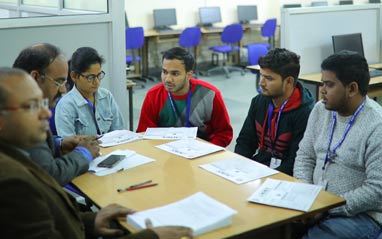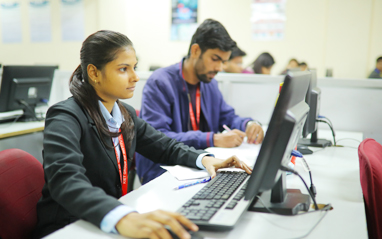Department of Computer Applications
About
Vision
To achieve excellence in the education of computer applications that can address industrial and societal issues globally.
Mission
- To provide relevant and advanced computer application concepts through outcome-based education.
- To provide a conducive environment for innovative and multidisciplinary research which significantly impacts society.
- To develop professional competence and employability skills through industry interactions and specialized courses.
- To create ethically and socially responsible professionals for the overall development of IT sector.


Programme Educational Objectives (PEOs)
The graduates will be able to:- Apply technical and professional knowledge to solve real-world problems faced by IT industry.
- Contribute to society and the environment as a responsible citizen by providing innovative computing solutions.
- Work harmoniously in teams with professional ethics and exemplary leadership qualities.
- Exhibit the attitude of continuous learning towards technological change and multidisciplinary research.
Programme Outcomes (POs)
The computing professional Graduate Attributes of the NBA are as following:- PO1 (Foundation Knowledge): Apply knowledge of mathematics, programming logic and coding fundamentals for solution architecture and problem solving.
- PO2 (Problem Analysis):Identify, review, formulate and analyse problems for primarily focussing on customer requirements using critical thinking frameworks.
- PO3 (Development of Solutions): Design, develop and investigate problems with as an innovative approach for solutions incorporating ESG/SDG goals.
- PO4 (Modern Tool Usage): Select, adapt and apply modern computational tools such as development of algorithms with an understanding of the limitations including human biases.
- PO5 (Individual and Teamwork): Function and communicate effectively as an individual or a team leader in diverse and multidisciplinary groups. Use methodologies such as agile.
- PO6 (Project Management and Finance): Use the principles of project management such as scheduling, work breakdown structure and be conversant with the principles of Finance for profitable project management.
- PO7 (Ethics): Commit to professional ethics in managing software projects with financial aspects. Learn to use new technologies for cyber security and insulate customers from malware
- PO8 (Life-long learning): Change management skills and the ability to learn, keep up with contemporary technologies and ways of working.
